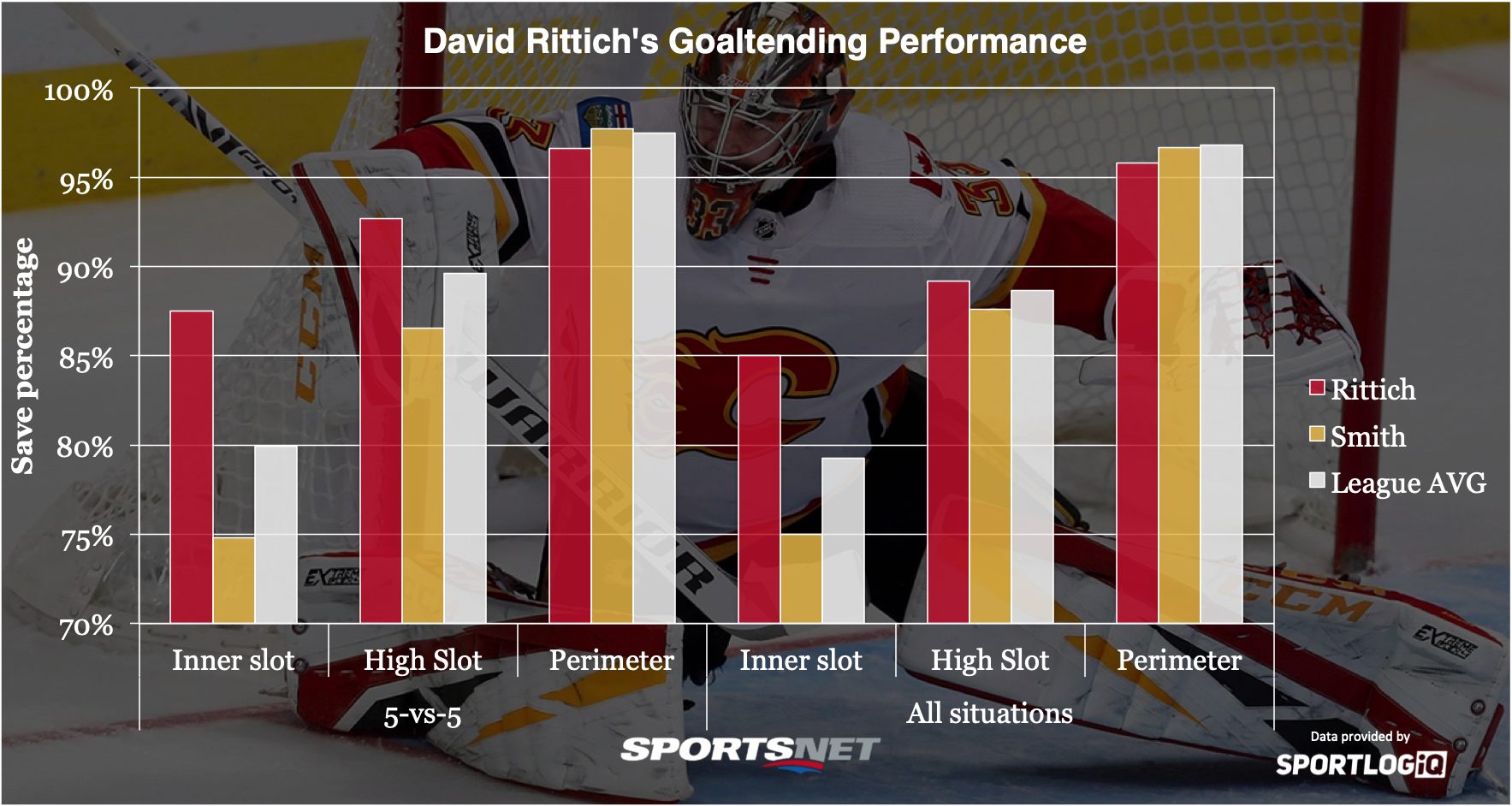For a few seasons now, it’s been my view that the Calgary Flames were underachieving based on the quality of their roster, and the style they play. This season, though, everything seems to be clicking perfectly, with captain Mark Giordano putting forth a Norris quality season and Johnny Gaudreau in the Hart conversation. The performances from those two aren’t a big surprise.
What has been a surprise, and possibly the biggest change to the Flames’ fortunes this season, has been the emergence of “Big Save Dave” Rittich. He has grabbed the starter’s reigns from Mike Smith, despite a lot of hesitation from the coaching staff to give them over fully.
[snippet id=4265503]
On the surface, Rittich’s .917 save percentage may not seem that impressive. We’re used to an era where the NHL’s average save percentage had climbed all the way to .915 as recently as 2015-16, but this season we’re at about .908. So adjusting that for our expectations in our heads, the same level of performance Rittich is giving would be a .924 save percentage back in 2015-16. That looks a lot better, doesn’t it?
Rittich’s save percentage stands out even more compared to Smith, who has struggled mightily this season with a .888 save percentage. Smith has given the Flames quality starts in just 41.7 per cent of his appearances, while Rittich has one of the highest marks in the league with 64 per cent quality starts.
So we know that Rittich has been better overall, and more consistent than his teammate, but let’s break down where his strengths have been.

Breaking things down by zone and looking at expected save percentages, we can see that Rittich’s out-performing of Smith might be even more staggering than raw save percentage would show.
In previous seasons, Smith’s size and smart positioning had allowed him to post among the league’s best high danger save percentages, with opponents not having much to look at once they got close to the net. He was a bit more exposed in the high slot where there’s more puck movement.
This season Smith has remained below average in the high slot, but lost his ability to stop those high danger shots. As for Rittich, he’s wildly above average in both areas at 5-vs-5, even boasting the best high danger save percentage in the entire league at .875, a remarkable feat.
On special teams, Rittich hasn’t been able to have the same type of impact he has at even strength, but those numbers can fluctuate pretty wildly in small samples. His overall numbers within the slot remain above average.
[snippet id=3816507]
What is a little surprising is that Rittich has been a hair below average from the perimetre. While it seems weird to criticize a .958 save percentage, the average goaltender in the NHL this year is stopping pucks at a .968 rate from the perimetre in all situations, so Rittich is letting in an extra goal every 100 shots from that area. It’s not a huge deal, but could mean that he’s a bit vulnerable to screens, which makes sense for a goaltender still establishing himself in the NHL. He has only played in 50 NHL games after all.
In terms of the shot difficulty Rittich faces, 22.9 per cent of his shots against come from the inner slot, and 22.4 per cent are taken from the high slot. In comparison, Smith faces 23 per cent of his shots from the inner slot and 23.9 per cent from the high slot. Based on those numbers, we can safely assume the Flames do a slightly better job protecting their younger goaltender than their veteran in terms of shot locations, but it’s not nearly enough of a gap in shot quality to account for the severe differences in save percentage.
There are other factors to consider as well, like the fact the Flames do a better job stopping passes to the slot while Smith is playing than while Rittich is in net, allowing just 12.9 slot passes against per 60 minutes as opposed to 14 with Rittich. The Flames also recover 53.3 per cent of Smith’s rebounds, compared to just 51.5 per cent of Rittich’s.
All this to say, just because goalies play on the same team does not mean their situations are the same. They play against different teams, and their own team does not play carbon copied games every night.
Rittich isn’t a perfect goaltender, and coming out of almost nowhere at 26 years old might mean this season is more an outlier than predictor of future success. But right now, he is giving the Flames all they need and more to win games and look like legitimate contenders.
[relatedlinks]








